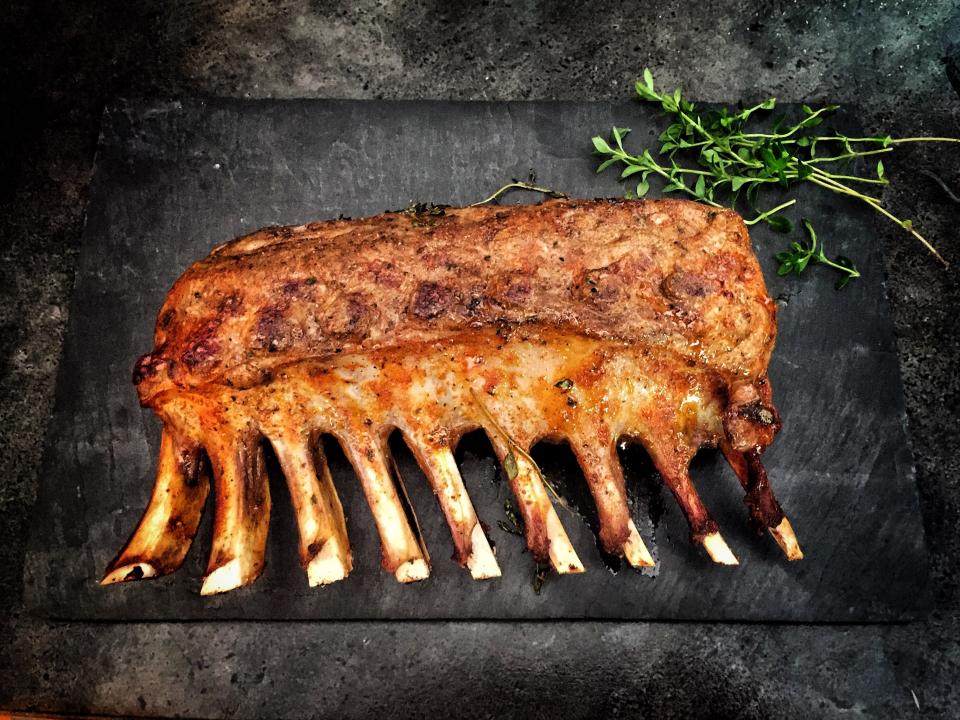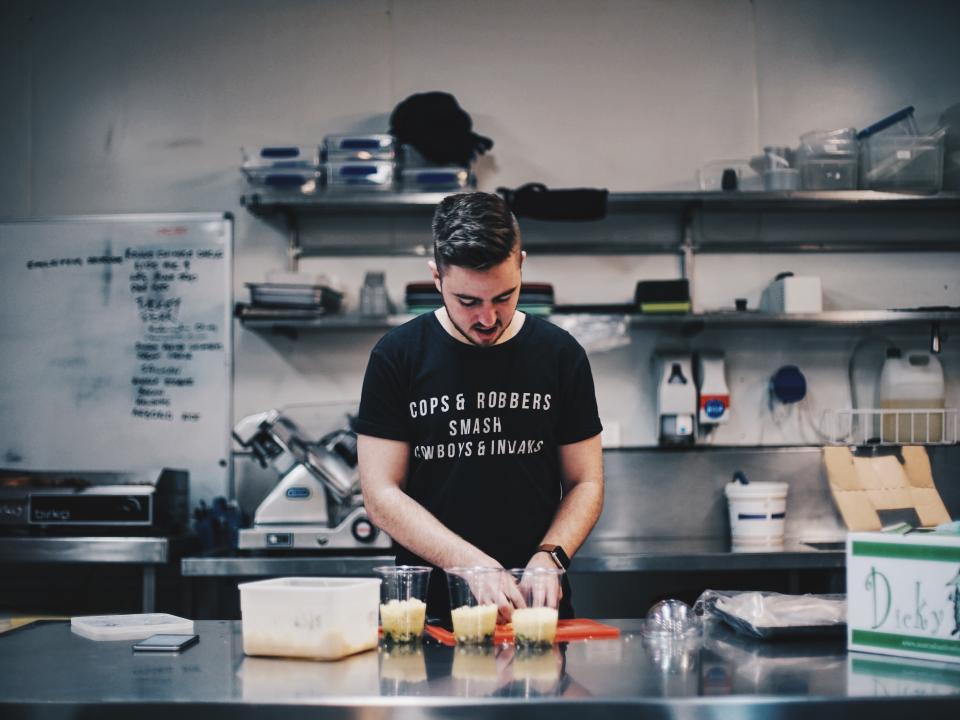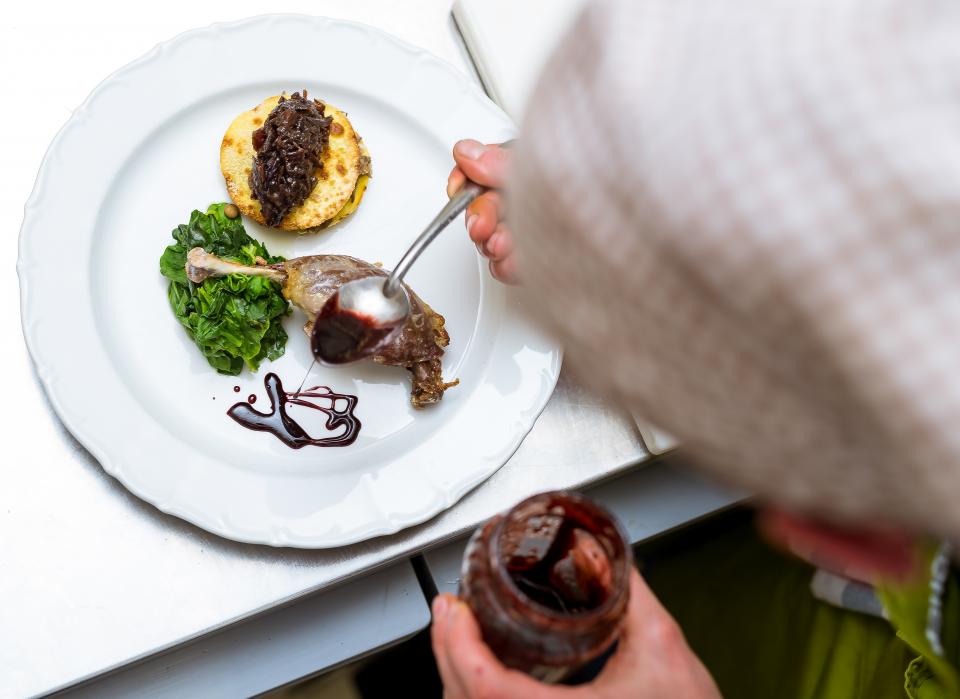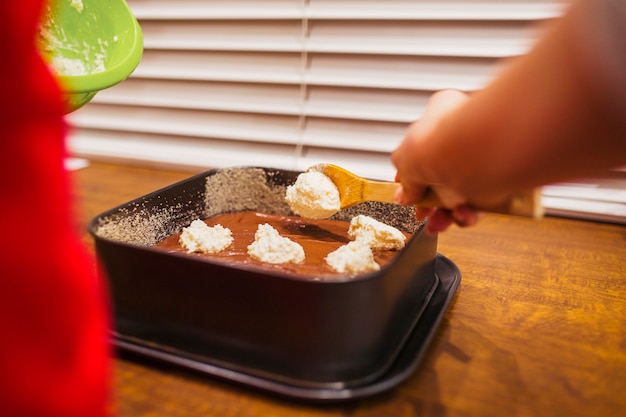Right, let’s talk about being a line cook. It’s a tough gig, no doubt about it. Long hours, hot kitchens, and the pressure to deliver perfect dishes every time – it’s not for the faint of heart. But, if you’ve got the passion for food, the dedication, and the stamina, it can be a truly rewarding career. I’ve been in the industry for over a decade now, starting out as a line cook myself, and let me tell you, it’s a journey. So, buckle up, and let me take you on a tour of what it really means to be a line cook.
(Part 1) The Line Cook: A Kitchen Warrior

Picture a high-pressure, fast-paced environment, where every second counts and precision is paramount. That’s the heart of a restaurant kitchen, and the line cook is right in the thick of it. Think of it like a well-oiled machine – each member of the team has their specific role, and they all need to work together seamlessly to deliver the goods. The line cook, well, they’re the engine room. They’re the ones responsible for prepping, cooking, and plating the dishes that come out to the diners.
The Line Cook’s Domain: A Station of Expertise
Each line cook typically has a specific station, like the grill, the saute, or the pasta station. They become experts in the techniques and dishes associated with their station, mastering the art of cooking everything from perfectly grilled steaks to delicate pasta dishes. You develop a deep understanding of the ingredients and techniques that go into making each dish perfect.
What Does a Line Cook Do?
It's more than just throwing some ingredients in a pan and calling it a day. There’s a whole lot of skill and technique involved. Here’s a rundown of the key tasks a line cook handles:
- Prep work: This is the foundation of any good kitchen – getting all the ingredients ready to go. Imagine chopping veggies with surgical precision, marinating meats with fragrant spices, making sauces that sing with flavor, and prepping garnishes that add the finishing touches. It’s a lot of work, but it sets the stage for a smooth service. It’s a vital part of the process, and it takes time and skill to get it right.
- Cooking: This is where the real magic happens. The line cook is the master of their station, responsible for cooking dishes to perfection. Whether it’s grilling steaks, sauteing vegetables, or whipping up a batch of pasta, they’ve got to have the skills and knowledge to nail it every time. They’re constantly monitoring the heat, adjusting cooking times, and ensuring each dish is cooked to the chef’s specifications. It’s a constant balancing act, and it’s what makes the line cook such a key part of the kitchen team.
- Plating: Presentation matters, you know. The line cook needs to know how to plate a dish beautifully, ensuring it’s visually appealing and looks as good as it tastes. It’s not just about piling food onto a plate. It’s about creating a symphony of colors, textures, and aromas.
- Maintaining cleanliness: Hygiene is paramount in any kitchen. Line cooks are responsible for keeping their station and equipment clean and sanitized throughout their shift. This includes everything from cleaning their knives and chopping boards to wiping down surfaces and ensuring all the equipment is spotless. It’s a never-ending task, but it’s essential for ensuring the safety and quality of the food.
- Working as part of a team: This is crucial. Line cooks need to work together seamlessly with the chefs, other line cooks, and the rest of the kitchen crew to keep things running smoothly. It’s a team effort, and everyone plays a part. Communication is key, and everyone needs to be on the same page to ensure a successful service.
The Challenges of Being a Line Cook: A Test of Strength and Stamina
It’s not all glamorous, you know. There are some real challenges that come with the territory. Here are just a few:
- Long hours: Restaurants don’t always operate on a 9-to-5 schedule, so you can expect to work evenings, weekends, and even holidays. It’s a demanding job, and you need to be prepared for it. You’re likely to be working when everyone else is out having fun, but it’s part of the job.
- Fast-paced environment: The kitchen is a high-pressure, fast-paced environment. Orders come flying in, and you need to work quickly and efficiently to keep up. It’s not for everyone. It takes a certain level of focus and concentration to handle the chaos and keep everything moving smoothly.
- Hot and demanding environment: Imagine working in a hot, steamy kitchen, on your feet for hours on end. It takes a certain level of physical and mental stamina to handle it. It’s tough, but it's also exhilarating. You develop a thick skin and a resilience that you carry with you throughout your life.
- Physical demands: Line cooks are constantly on their feet, lifting heavy pans, and using sharp knives. You need to be in good physical shape to handle the demands of the job. It’s a physical job that requires strength, agility, and endurance. You’re going to be moving around a lot, so be prepared for a workout.
- Dealing with stress: It’s a high-pressure environment, and it’s important to be able to handle stress well. There’s always something going on, and it’s essential to stay calm and focused under pressure. You learn to think on your feet and to adapt to changing circumstances. You learn to roll with the punches and to keep your cool even when things get chaotic.
(Part 2) The Line Cook’s Toolbox: Skills and Qualities

Being a line cook isn’t just about following recipes and knowing how to use a knife. There’s a whole set of skills and qualities that make a good line cook great. Let’s break it down:
Essential Skills: Mastery of the Craft
- knife skills: A line cook’s weapon of choice. You need to be a master of the knife, able to chop, dice, and mince with precision and speed. It's about efficiency and accuracy. Think of it as a dance with the knife, where every movement is deliberate and purposeful. It takes practice and patience to develop these skills, but it’s essential for any line cook.
- cooking techniques: Knowing how to cook different types of food using various techniques – grilling, sauteing, braising, roasting – is essential. It’s all about understanding how heat affects different ingredients and achieving perfect results. You’re not just cooking; you’re manipulating heat and time to create culinary masterpieces.
- food safety and hygiene: Crucial for any kitchen. Line cooks need to be well-versed in food safety procedures, from proper handling to storage, to prevent foodborne illnesses. This involves everything from washing your hands frequently to using separate cutting boards for meat and vegetables. It’s about safeguarding the health of the diners and maintaining the highest standards of food safety.
- Time management: Multitasking is a line cook’s superpower. You need to juggle multiple tasks at once, manage your time efficiently, and prioritize orders to ensure everything runs smoothly. It’s like a symphony of movements, where every dish is prepared and served at the right time, ensuring a smooth and efficient flow of orders.
- Communication: Communication is key in any kitchen, and line cooks need to be able to communicate effectively with the chef and other team members. This involves being able to convey information clearly, concisely, and quickly, ensuring everyone is on the same page. It’s a language of its own, where gestures and unspoken cues are just as important as words.
- Problem-solving: Things don’t always go according to plan in the kitchen. Line cooks need to be able to think on their feet, adapt to changes, and come up with solutions quickly. This could mean dealing with a sudden rush of orders, adjusting cooking times, or improvising when ingredients run out. It's about resourcefulness, adaptability, and a quick mind.
Personality Traits: The Heart of a Line Cook
It’s not just about skills, you know. Some personality traits can make you a better line cook:
- Passion for food: A love for food is essential. You need to be passionate about creating delicious dishes and making people happy with your food. It’s not just about the money or the recognition. It’s about the joy of creating something special and sharing it with others.
- Dedication and work ethic: The kitchen is demanding, and you need to be willing to put in the long hours and effort to succeed. You're going to be putting in those late nights, and it's going to be worth it. You'll need to be dedicated to your craft, constantly striving to improve and learn new things.
- Stamina and physical fitness: You’ll be on your feet all day, lifting heavy things, and working in a hot environment. It takes stamina and physical fitness to handle the demands of the job. You’ll need to be able to endure the heat, the pressure, and the long hours. It's like a marathon, and you need to be in good shape to finish strong.
- Team player: You need to be able to work effectively as part of a team and collaborate with your fellow cooks, chefs, and other kitchen staff. You’ll be relying on your team members, and they’ll be relying on you. It’s about teamwork, trust, and mutual respect.
- Resilience: The kitchen can be stressful, and you need to be able to bounce back from setbacks and stay positive even when things get tough. There are going to be days where it seems like everything is going wrong, but you need to be able to keep your head up and keep working. You learn to be resilient, to embrace challenges, and to come back stronger than before.
(Part 3) The Line Cook’s Career Path: Where It Can Take You

Don’t think of being a line cook as a dead-end job. It can be a launchpad for a fulfilling career in the culinary world. Let’s explore the different paths you can take:
Climbing the Kitchen Ladder: A Journey of Growth and Development
Think of it like a staircase. Each step you take builds on your experience and skills. Here’s how it typically works:
- Line Cook: The starting point. This is where you learn the ropes, build your foundation, and gain valuable experience in the kitchen. It's where you hone your skills, develop your knowledge, and learn the art of cooking in a high-pressure environment.
- Lead Line Cook or Station Cook: With more experience and expertise, you can become a lead line cook, overseeing a specific station or a group of line cooks. It’s a step up in responsibility and leadership. You’ll be mentoring your team, ensuring quality, and managing the flow of orders for your station.
- Sous Chef: This role is all about supporting the Head Chef. You’ll be responsible for managing the kitchen, training staff, developing recipes, and ensuring the quality of the food. It's a crucial role that requires a lot of knowledge and experience. You’ll be the right-hand person to the Head Chef, helping to create menus, manage the team, and ensure everything runs smoothly.
- Head Chef: The top of the kitchen hierarchy. The Head Chef is responsible for everything – creating menus, managing the kitchen staff, and overseeing the entire operation. It's a challenging and rewarding position. You’ve worked your way up, and you've got the skills and experience to lead. You’ll be the vision behind the restaurant, creating culinary experiences that delight diners and build a reputation for the establishment.
Expanding Your Horizons: Beyond the Traditional Kitchen
Beyond the traditional kitchen, there are other opportunities for line cooks to explore:
- Private Chef: Work for individuals or families, creating personalized menus and preparing meals in their homes. You'll be providing a truly bespoke culinary experience. It's a great way to showcase your creativity and to cater to the unique tastes and preferences of your clients.
- Food Stylist: Use your culinary skills to create beautiful, appealing dishes for food photography and videography. It’s a creative field that combines food and visual arts. You’ll be working with photographers and videographers to create stunning visuals that make food look irresistible.
- Food Blogger or Writer: Share your passion for food by writing about recipes, cooking techniques, and culinary trends. It’s a great way to connect with food enthusiasts and build a following. You’ll be using your culinary expertise to educate and inspire others, sharing your knowledge and insights about the world of food.
- Culinary Instructor: Teach others the art of cooking, sharing your knowledge and experience with aspiring chefs. It's a way to give back and inspire others to embrace the world of food. You’ll be passing on your skills and passion to the next generation of cooks, helping them to develop their own culinary talents.
- Restaurant Owner or Manager: For those with an entrepreneurial spirit, opening a restaurant or managing a culinary establishment can be a rewarding venture. You'll be putting your skills and experience to use in building your own business. You’ll be responsible for every aspect of the restaurant, from creating the menu to managing the staff to marketing the business.
(Part 4) The Line Cook’s Education and Training: Getting Started
Now, you might be wondering: how do I actually become a line cook? It's not as complicated as you might think. Let's talk about the path to getting your kitchen career started.
Formal Culinary Education: Building a Strong Foundation
A formal culinary education can give you a strong foundation in cooking techniques, food safety, and restaurant operations. Here are a few options:
- Culinary School: Offers diploma or associate degree programs in culinary arts. You'll learn everything from basic knife skills to advanced cooking techniques, as well as restaurant management and food service. It’s a structured environment where you can learn from experienced chefs, practice your skills, and gain a comprehensive understanding of the culinary industry.
- Vocational Training: Provides shorter-term programs focused on specific culinary skills. It’s a good option if you want to gain practical experience quickly. These programs are more hands-on and practical, focusing on developing specific skills that are essential for working in a kitchen.
- Online Courses: Offer flexible learning options, allowing you to study at your own pace. You can find courses on specific cooking techniques, food safety, and even restaurant management. These courses provide a convenient way to learn about different aspects of cooking and the food industry, allowing you to study at your own pace and on your own schedule.
Gaining Experience: The Real-World Kitchen
Formal education is great, but nothing beats hands-on experience. Here’s how you can get started:
- Apprenticeship: Work under the guidance of an experienced chef, learning the ropes of the kitchen firsthand. It's a great way to gain practical skills and build relationships in the industry. It's the traditional route, and it's a good way to learn the craft from the ground up. You’ll be working alongside a chef, absorbing their knowledge and skills, and getting hands-on experience in a real-world kitchen.
- Internship: A short-term opportunity to work in a restaurant, gaining exposure to different aspects of the kitchen operation. It's a great way to test the waters and see if this career is for you. It’s a great way to get a taste of what it’s like to be a line cook, to learn the workflow, and to see if it’s the right fit for you.
- Entry-level Positions: Start out as a prep cook or a dishwasher, gaining experience in the kitchen and learning the basics of food handling and preparation. This is a good way to get your foot in the door. These positions might not be glamorous, but they’re a great way to learn the fundamentals of kitchen work and to build the foundation for a career in cooking.
(Part 5) The Line Cook’s Compensation: What to Expect
Okay, let's get real about the money side of things. The salary for line cooks can vary depending on factors like experience, location, type of restaurant, and the restaurant's overall success. Let’s break it down:
Typical Salary Range: A Look at the Numbers
The average salary for a line cook in the UK ranges from around ??20,000 to ??30,000 per year. However, keep in mind that this is just a starting point. The actual salary can vary significantly depending on factors like experience, location, and the type of restaurant.
| Experience Level | Typical Salary Range |
|---|---|
| Entry-level | ??18,000 - ??25,000 |
| Experienced | ??25,000 - ??35,000 |
| Lead Line Cook | ??30,000 - ??40,000 |
Factors Affecting Salary: What Influences Your Earnings
- Location: Salaries tend to be higher in major cities, where the cost of living is greater. You'll be paid more in London than in, say, Manchester. The higher cost of living in cities often translates to higher wages to attract and retain skilled workers.
- Type of Restaurant: Fine dining restaurants often pay higher salaries than casual dining establishments. The level of cuisine and the overall demand can affect your income. The more demanding the cuisine, the higher the skills required, and the more you’ll likely be compensated.
- Restaurant Success: Busy and successful restaurants often offer better wages to attract and retain skilled line cooks. The more successful the restaurant is, the more they can afford to pay. Successful restaurants are often able to offer higher wages and benefits to attract and retain top talent.
- Experience and Skills: The more experience and skills you have, the more valuable you are to the restaurant, and the higher your salary potential. Your experience and skills will be your biggest assets. As you gain experience and hone your skills, your earning potential will increase.
(Part 6) The Line Cook’s Journey: Personal Insights and Reflections
Being a line cook is more than just a job – it's a journey. It’s about pushing your limits, honing your skills, and discovering the beauty of creating food. I've been there, starting as a young, enthusiastic line cook, navigating the heat, the pressure, and the long hours. It was tough, but it was also incredibly rewarding. It taught me resilience, discipline, and a deep appreciation for the art of cooking.
My Line Cook Story: A Look Back
I remember my first kitchen job – a small, bustling cafe in the heart of London. I was thrown into the deep end, surrounded by experienced cooks, all working at a furious pace. I was nervous, intimidated even, but also excited. I learned so much – how to chop onions like a pro, how to sear a steak to perfection, how to work as part of a team. I made mistakes, of course, but I learned from them. I discovered a passion for creating dishes that brought joy to people. It’s a feeling you don’t forget.
The Importance of Passion and Dedication: The Driving Force
Being a line cook isn’t easy, but it’s incredibly fulfilling. You’re constantly learning, growing, and pushing your boundaries. The key is to have a passion for food and a dedication to the craft. If you're driven by that, you can overcome any challenge. You'll find that the heat of the kitchen is addictive, the pressure is exhilarating, and the reward of a satisfied customer is priceless.
(Part 7) The Line Cook’s Future: Embracing the Evolution of Food
The culinary world is constantly evolving, and line cooks need to be adaptable and embrace new trends and techniques. From farm-to-table movements to the rise of veganism and the explosion of global cuisines, the industry is buzzing with new ideas and innovations. It's a dynamic and exciting time to be involved in food. It's an exciting time to be a part of this creative and constantly evolving world.
The Future of Culinary: Trends to Watch
Here are some key trends shaping the future of line cookery:
- Sustainability and Local Sourcing: Restaurants are increasingly focused on sourcing ingredients locally and sustainably. Line cooks need to be knowledgeable about seasonal produce, ethical farming practices, and reducing food waste. It’s about being mindful of the environment and supporting local farmers, while ensuring the quality and freshness of the ingredients.
- Plant-based Cuisine: The demand for vegan and vegetarian options is on the rise, and line cooks need to be able to create delicious and innovative plant-based dishes. It's about more than just salads and veggie burgers. It's about creativity and the ability to create dishes that are both satisfying and flavorful. It’s about embracing the plant-based movement and creating dishes that are both delicious and sustainable.
- Global Influences: The culinary landscape is becoming increasingly diverse, with global cuisines gaining popularity. Line cooks need to be open to learning new techniques and flavors from around the world. Think of all the flavors you'll get to explore. It’s about expanding your palate, exploring different cultures, and bringing new and exciting flavors to your cooking.
- Technology in the Kitchen: From smart ovens to food delivery apps, technology is transforming the kitchen. Line cooks need to be adaptable and comfortable using new tools and technologies to enhance efficiency and creativity. It’s about embracing the digital age and using technology to streamline workflows, improve efficiency, and enhance the dining experience.
- Focus on Health and Wellness: Consumers are becoming more conscious of their health and wellbeing. Line cooks need to be able to create dishes that are both delicious and healthy. Think about all the different dietary needs you'll be catering to. It’s about balancing flavor and nutrition, creating dishes that are both delicious and good for you.
(Part 8) FAQs: Your Questions Answered
You might have some questions about being a line cook. Here are some of the most common ones, along with my answers:
1. What are the best ways to prepare for a career as a line cook?
The best way is to get hands-on experience in a kitchen. Consider taking a culinary course, doing an apprenticeship, or starting out in a basic kitchen role. It’s all about learning the ropes, building your skills, and gaining experience. The more experience you gain, the more confident and skilled you’ll become.
2. What are some common mistakes line cooks make?
A common mistake is not being prepared. Make sure you're organized, have your ingredients ready, and know your recipes well. Another mistake is neglecting food safety protocols. It's crucial to maintain hygiene standards at all times. It's about being organized, prepared, and following the proper procedures to ensure the safety and quality of the food.
3. What are some tips for succeeding as a line cook?
Stay organized, be efficient, and communicate clearly with your team. Learn from experienced cooks, stay updated on food trends, and never stop developing your skills. The more you learn, the better you'll be. It's about continuous learning, improvement, and adapting to the ever-changing world of food.
4. How can I find a line cook position?
Check online job boards, visit restaurants, and network with people in the industry. Reach out to chefs you admire and express your interest in working with them. It's all about building connections and making yourself known. It’s about being proactive, networking, and putting yourself out there.
5. Is being a line cook worth it?
That’s a personal question. If you love food, thrive in a fast-paced environment, and are dedicated to mastering your craft, then absolutely! It's a tough gig, but it’s incredibly rewarding. You’ll be part of a dynamic world, creating delicious food that brings joy to people. And, if you're passionate about it, it's a career that can take you anywhere. It's about passion, dedication, and a love for the craft. If you have those things, then being a line cook can be an incredibly rewarding and fulfilling experience.
Everyone is watching

How to Cook Frozen Lobster Tails Perfectly: A Step-by-Step Guide
RecipesLobster. Just the word conjures up images of lavish meals, special occasions, and a taste of luxury. But let's...

Pigs in a Blanket Cooking Time: How Long to Bake for Perfect Results
RecipesAh, pigs in a blanket. Just the name conjures up images of those delightful little parcels of crispy pastry en...

Pork Fillet Cooking Time: How Long to Cook It Perfectly
RecipesPork fillet, or tenderloin as it's sometimes called, is a real favourite in our house. It's so versatile, and...

The Ultimate Guide to Cooking Delicious Frankfurters
RecipesLet's face it, we all love a good frankfurter. It's a classic, simple, and always satisfying. But let's be rea...

Wolf Meat Recipes: A Guide to Cooking Wild Game
RecipesLet's be honest, you don't see wolf meat at your local butcher shop every day. It's a bit of a wild card, but ...
